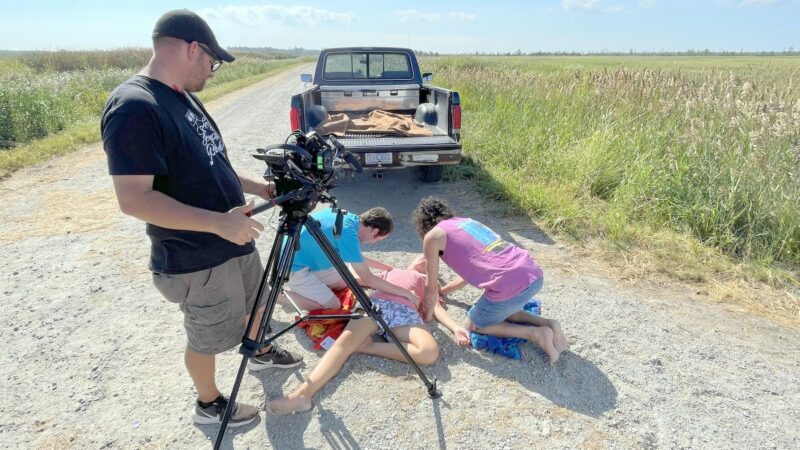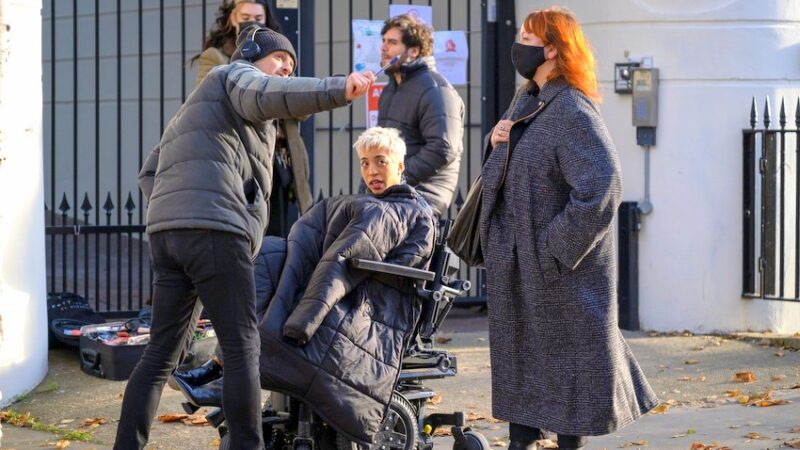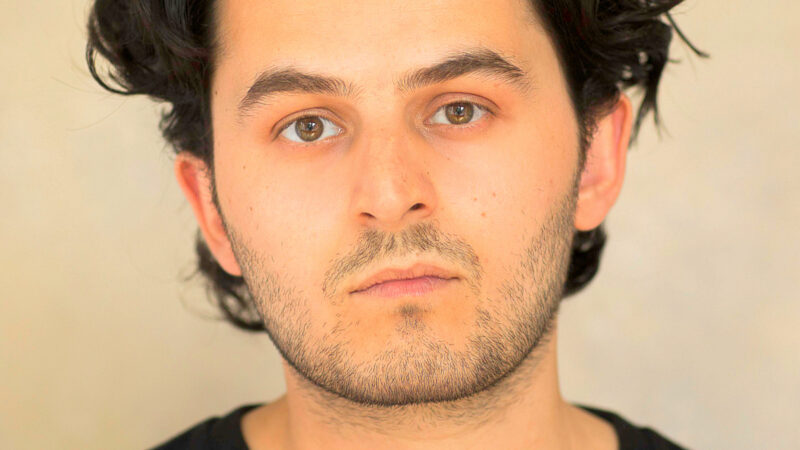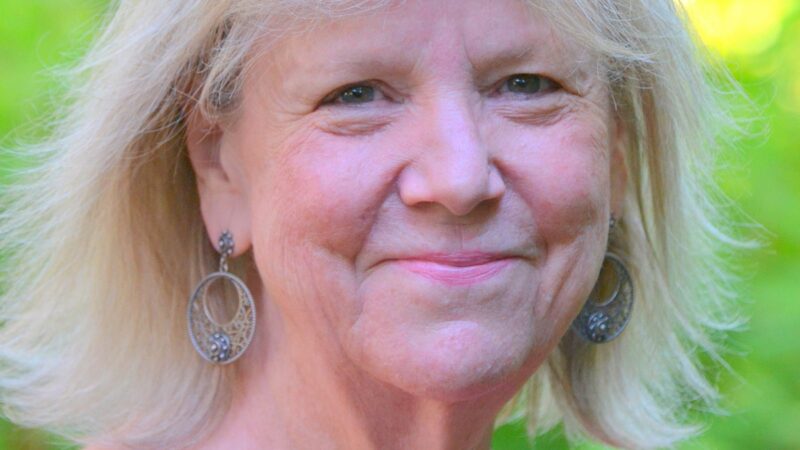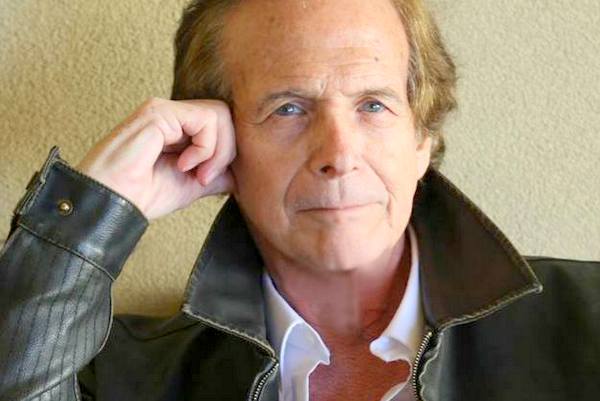
Well actually, I always wanted to Direct, to tell stories, I just fell into acting out of necessity. I started making movies when I was about 10 or 11 with a Super 8 camera and some school friends. I’d write these little funky dramas and when I couldn’t get one of the guys to do his part right, I’d hand the camera to someone else and just step in and do it. I never stopped making these little stories; even won a few awards way back when, for a 30 minute Super 8 film I made called “The Wonderful World of Brother Grimm”. Also, growing up in NYC in my late teens I was able to audition for and study with some of the greatest acting teachers in the world. But I was a bit of a maverick and I got bored easily so I moved from one teacher to another, which ultimately gave me a sense of every contemporary style of acting and led me to develop a style of my own. This early training is what formed the basis for my ability to working intensely with actors as a director. Today, I’m thought of as an actor’s director. Acting lessons should be mandatory for young directors. If you don’t understand an actor’s problems, how are you going to direct them properly through a complex script?
TBT… In England filming a movie in my early 20’s. pic.twitter.com/3l11dIXH9L
— Alyn Darnay (@AlynDarnay) March 30, 2017
Did you study what you do?
I did study filmmaking, and was for a time a script reader for two of the major studios. However, my real education came after school. I went to work for academy award winning producer Albert Zugsmith at Famous Players Corporation making B-grade films. I did every job conceivable and finally, truly, learned everything from production, to editing, to cinematography, from all the incredible freelancers that came to work on our projects and graciously took the time to teach an eager youngster what they knew. For this I will always be grateful.
What is your filmmaking process?
I actively utilize and occasionally teach a derivative acting style I call ACTING INTELLIGENCE™. It’s a method of acting I developed through years of working with actors as director, actor and scriptwriter. It blends my own training, award-winning experience, and understanding of today’s style of acting preparation and performance with elements taken from the standard methods of Stanislavski, Strasberg, Hagen, Meissner, and Adler. This method breaks down the psychology of acting study, practice, and style into an easily executable methodology aimed at fostering believable performance from any individual. I find that this method develops unique techniques within the individual actor that allow him/her to reach their full potential. I’m currently working on a new book that defines this style; should be out next year. Please note that unlike any other period of history, one style of acting just won’t cut it today. You must find and take from various teachers and styles those things that work for you as an actor and disregard the rest.
The “Alyn On Acting” Workshop Feb 2017. A Group of Exceptional Florida Actors! pic.twitter.com/ChbG2yd4uC
— Alyn Darnay (@AlynDarnay) February 26, 2017
Tell us about the acting work that you have done lately?
I was doing well as a young actor in LA, but stopped acting when I was about 22 and stepped full time behind the camera. However, several years ago, right after directing a film called ”CONDUIT” (which won 17 major awards at festivals, plus 7 Best Actress Awards, and an Award for Excellence in Filmmaking) a good friend of mine, director Walter Rodriguez approached me with a role he had written just for me and talked me into doing it with one of the best monologues ever. The film is called “DECALOGUE” and it’s won numerous awards. That led to another film and another and before I knew it I had done 30 films as an actor. Before you ask, my favorite roles so far are in the films “Hollow Creek” where I played a sociopathic homicidal backwoodsman and in “The Consultation” playing a disturbed criminal psychologist. Lessons to be learned; you’re never too old to begin an acting career, and never give up on the things you do best. Acting, like every other career, is a business. It must be treated like one. It is your job. Stay in shape, keep on top of your game, take classes to keep yourself fresh and learn new techniques, and always treat every audition like a hired job. Oh, and don’t get discouraged if you don’t get picked, ‘You’re One Step Closer To The Part You Will Get!’
Do you take courses to increase your craft?
Personally, everything I do is a class. Every mistake I make is a class. Even when I’m teaching acting, it’s a learning experience for me too. The whole world is a classroom if you take the time to study it. Study the people around you. They are all different, individual, each with their own quirks and mannerisms. Study them and incorporate their actions into your repertoire as an actor to be used at a later date. Study the situations around you to see how people react, file those things away as well. And of course take continuing acting lessons, but don’t stick with one teacher or style. You never know when one of your teachers will say something small and you finally get that “A-HA” moment that wakes you up and holds the key that finally opens your door to deeper understanding.
From upcoming GIRLFRIEND KILLER film-a Prod Still of ‘3 Film Musketeers’ Camera Op Greg Jacoy, Director Alyn Darnay, & DOP Jon Schellenger. pic.twitter.com/46m6HPZsjS
— Alyn Darnay (@AlynDarnay) January 17, 2017
How do yo combine directing, acting, producing and writing?
Ah, that question hits the nail on the head. If you don’t combine them all perfectly you have very little to give to any project. The more I do, the more I learn, the more I understand the links that combine them all. For instance…It all begins and ends with the script. If you have a great script to start with, chances are you’ll make a good movie. However, not even great actors and a great director can save a bad script, but sometimes, mediocre actors with a fair director can save a movie with a great script, though usually not. Add to that mix the producer who is either good at the job or leaves the cast and crew unarmed to make the film. By that I mean a producer who is not film friendly, hogs the money, demands too much from everyone, and alienates the whole company. So, the lesson is find or write a tight Script that has wide audience appeal, and don’t start working toward a production until it’s absolutely right. Thinking you can fix the script on set will never work. (Pick up a copy of my bestselling book ”The Script…A Breakthrough Guide To Scriptwriting’, it’ll give you all the basics you need to write a marketable screenplay – www. alyndarnay.com). I could go on for hours about this, but you get the idea.
How do you turn an idea into a screenplay?
Of course it always starts with an idea. Where do ideas come from? Who knows? I always say “they fall from the sky like a gentle rain from the heavens”. Wherever your idea comes from, it appears. But not every idea will make a marketable script. There are many ways to check its viability, too many to discuss here. The thing is, if you’re interested in the concept, chances are there millions of people out there that will also be interested, and that my friend is what makes for a good beginning.
TBT 1995…On A Three Month Assignment Filming In China. pic.twitter.com/bLSWpP09VC
— Alyn Darnay (@AlynDarnay) December 15, 2016
Briefly explain your writing process?
It would take 4 weeks of my screenwriting classes to do that properly. But it always begins with research, lots of research. Before I even think of putting my pen to paper or finger to computer, I know my subjects forward and back. You can’t expect to just run to the story head on without understanding it first, you’ll wind up spending weeks running in circles. I first begin the writing process with a multi-page treatment that goes through several stages before I even think to begin the script itself.
What writing tip or idea can you offer young writers?
Be absolutely sure you’re committed to the story and the time it will take to write it, or find a ghostwriter to do it for you.
Tell us about the directing work you have done?
Got a few days? I’ve been directing for a lot of years in every genre, Theater, Film, Radio, Commercial, Music Video, and Television. My actual credit list runs two and a half pages single-spaced. Lately I’ve confined my self to making Feature Motion Pictures with the exception of one intense short. This past year there have been three. The inner-city fable “Shadow Fighter” beginning to make the rounds of the major film festivals, “Boyfriend Killer” set in Miami’s glittering gold coast destined for Lifetime Television, and the Holocaust short “IM•MU•IN•TY which has already won 5 major awards, two best films, two best actress, and an award of excellence in filmmaking. Next up, “Girlfriend Killer”, the 4th film in the “Killer Series” produced by the amazing Barbie Castro and her company Concord Films. In the wings is “The Vet” from an original script by Lloyd Wagner and Myself.
Tomorrow, Sat Nov 12th 12:30pm.-IM•MU•NI•TY is being screened at The Fort Lauderdale Film Festival Don’t Miss this multi-award winning film pic.twitter.com/iCiBvfFSv1
— Alyn Darnay (@AlynDarnay) November 11, 2016
What do you want to change about the film business?
Get rid of the bean counters, they are destroying the creativity of the business and flooding the market with nothing but big budget effects Super Hero Films. Getting awfully boring don’t you think? Where are the little films? The intense human dramas that help us understand ourselves better? I miss those. I miss things like: The Three Color Trilogy, or the imagination of say Stanley Kubrick, or Antonioni, Hitchcock, Bertolucci, DePalma, Russell, Almodovar, Altman, or even a John Frankenheimer. The newest crop of good directors all seem to wind up in television and not on the big screen. Not that there is anything wrong with that, but there’s something about telling the story on a big screen that can’t be beaten anywhere else.
What do you want to be remembered for?
I’d like to be remembered for the quality of the work that I’ve done, the story’s I’ve told and go out with my reputation as an “Actor’s Director” intact. I’d like to be thought of as a maverick who was also a giving, understanding, loving human being who supported humanitarian causes and ultimately be thought of as an inspirational teacher who helped create a whole cadre of future creators.
What do you want from an actor during a production?
That’s easy, 110% of their ability every second they are on my set. I expect them to show up with all their lines learned, their characters in tact as we’d previously discussed, and an ability, without argument, to try those things I ask that will improve the film. Flexibility in their technique is something I value and look for.
TBT…As we begin Sound Design on “Boyfriend Killer” I’m reminded of what it was like way back in the eighties. pic.twitter.com/5RZ0FmUNmc
— Alyn Darnay (@AlynDarnay) July 7, 2016
How do you prefer to work with a producer during a production?
Closely. I like the Producer to be an active working partner standing right next to me to insure the continued quality of the production. A producer who is there and can see what’s happening is much better than an absentee producer you have to explain everything to all the time.
What do you think a director can do to get into the film industry?
Make films, lots of them, and short good films for festivals. Work on any production you can in any capacity to watch, study and learn. Go to networking meetings, read scripts, watch movies. Put yourself wherever filmmakers congregate. Get an agent, treat it as a business and tackle the industry in that manner.
Who is your favorite director
Stanley Kubrick
Why this director
He is most certainly one of the greatest and most influential directors in all of cinematic history. His films have always managed to uncover the human soul in ways you never see coming by using his unique twisted version of realism, dark humor, matchless cinematography, all-encompassing set designs, and evocative use of music. Though the body of his work is mostly taken from previously written sources, novels and short stories covering many genres, he was always able to endow them with more depth and human sensibility than the writer could have ever expected. And…I love this quote from him:
“Anyone who has ever been privileged to direct a film knows that, although it can be like trying to write War and Peace in a bumper car at an amusement park, when you finally get it right, there are not many joys in life that can equal the feeling.” — Stanley Kubrick, accepting the Lifetime Achievement Award
Behind the Scenes on BOYFRIEND KILLER with Barbie Castro and Jon Schellenger. pic.twitter.com/Yvcw8OV4iT
— Alyn Darnay (@AlynDarnay) June 22, 2016
What advice would you give to directors around the world
Here are a few pieces of advice: Work from your heart and your experience. Don’t get bogged down in a single genre. Shoot pretty pictures but make sure every frame means something. Understand editing and “see the cut” as you shoot. Cast perfectly, you can’t fix that in the mix. Pay close attention to the sound being recorded or you’ll spend months in ADR sessions.
Briefly write about your career
Alyn’s peers and producers have consistently recognized his Directorial and Writing work as some of the “best of the best”. He has earned twenty-six outstanding awards of excellence for his work in film. Recently, “Women In Film/Miami” named him their “Director of the Year”.
Alyn has completed directorial work on the feature films: “Shadow Fighter” with Burt Reynolds; “KRISSY BELLE” featuring comic actress Carole Wood; and the multi-award winning Holocaust film “IMMUNITY” staring Rena Sofer. “Boyfriend Killer” his latest suspense feature starring Kate Mansi, Patrick Muldoon, Barbie Castro, and Yancy Butler is currently in post-production; it marks the second film he’s done with actress Barbie Castro, the first being “CONDUIT” which won awards at seventeen film festivals and garnered Barbie seven “Best Actress” awards.
Alyn’s acclaimed book, entitled “The Script…A Breakthrough Guide to Scriptwriting”, has sold over 16,500 copies nationwide, is currently being translated into several languages, and has the honor of being included in The Library of France in Paris. He has written and sold five original film scripts and been published in Newspapers and National Magazines. In addition, he is a frequent guest lecturer at Film Festivals, Colleges, and Universities, holds scriptwriting and acting seminars for professionals several times a year, and has been a staff professor at both the Miami Film School, and the Florida Film Institute.
Alyn also writes a popular bi-monthly film review column for “WIRE Magazine”, as well as reviews for “Your Entertainment Ticket”, “Irate Films”, “Film Grouch”, and several other entertainment websites.
INTERVIEWS
In Conversation with Michael Oblowitz Director of Confidential Informant
Confidential Informant stars Mel Gibson, Dominic Purcell, and Kate Bosworth
more interviews




